Journal
About Andrew Cusack
 Writer, web designer, etc.; born in New York; educated in Argentina, Scotland, and South Africa; now based in London.
Writer, web designer, etc.; born in New York; educated in Argentina, Scotland, and South Africa; now based in London. read more
News
Blogs
Reviews & Periodicals
Arts & Design
World
France
Mitteleuropa
Knickerbockers
Argentina
The Levant
Africa
Cape of Good Hope
Netherlands
Scandinavia
Québec
India
Muscovy
Germany
Academica
Sibiu/Hermannstadt
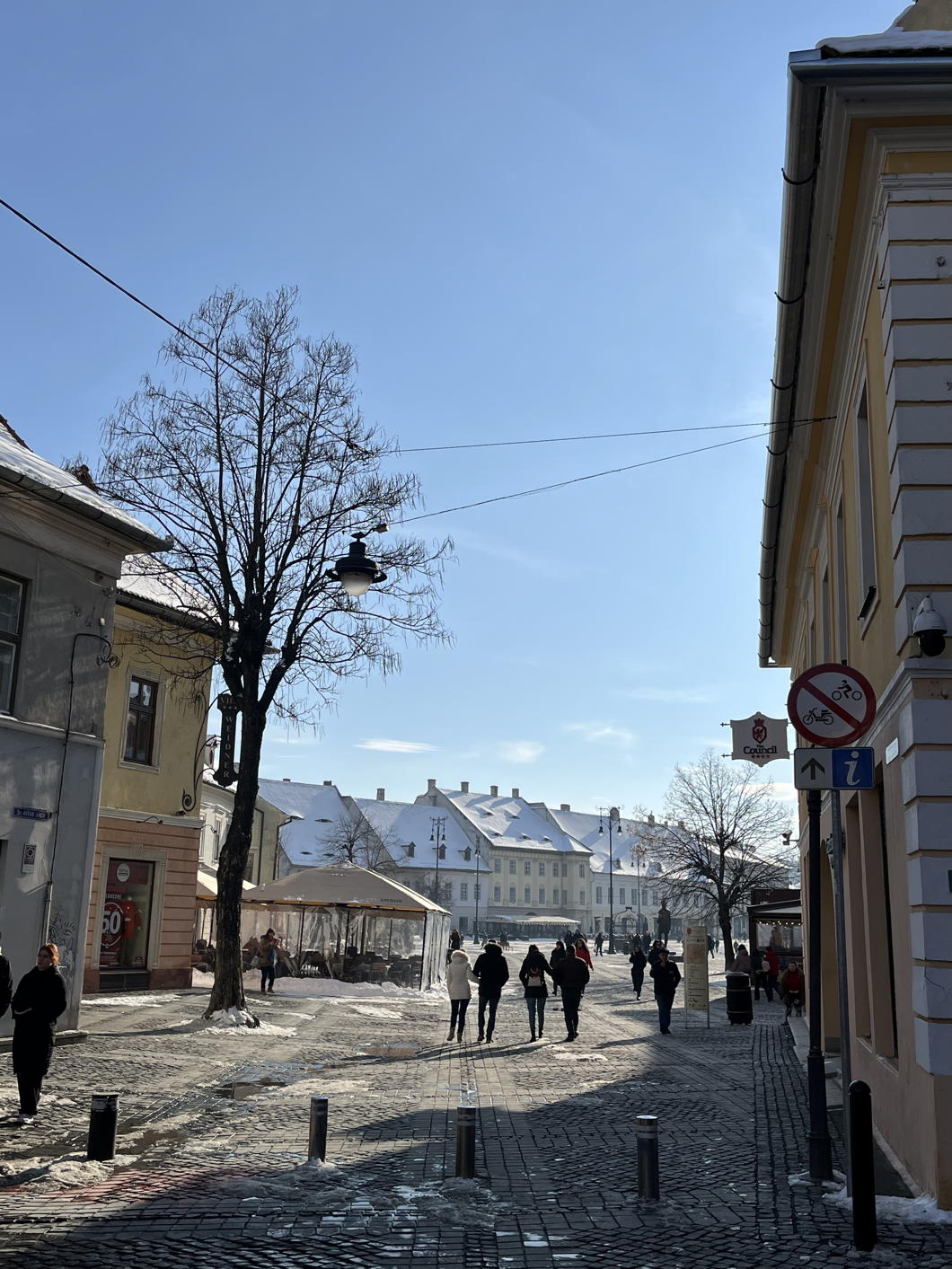
SIBIU’s name comes from a Bulgar-Turkic root word meaning “rejoice”, and having spent a few days in the city I can see why. It is handsome, clean, and clearly well looked after — perhaps well loved is the better term.
Unsurprisingly, the mayor partly responsible for this state of affairs was much vaunted for his efforts, to the extent that the Romanians elected him president of the entire country (and this despite him being an ethnic German).
As in all of Transylvania, there is a long history of mixture here, and while the past hundred years have seen a massive collapse in the Hungarian, German, and Jewish populations, many of them persevere all the same, sometimes even flourishing.
Hungarians are the largest and most visible minority in Transylvania — once the dominant people of this province of the Crown of St Stephen — but here in Sibiu they play second-fiddle to the Germans.
Arriving in the Church of the Holy Trinity in the great square for the Hungarian Mass on Sunday, the congregation at the Mass in German preceding it was still filtering away and clearly is the main event of the parish.
The Germans — or Saxons as they are often known — are today under two per cent of the city’s population but, as elsewhere, the Teutonic reputation for competence and efficiency means that a great many ethnic Romanians vote for the Germans’ party, the Democratic Forum of Germans in Romania.
When mayor Klaus Iohannis was elected to the Romanian presidency, he was succeeded as mayor by another member of the German community, the rather elegant Astrid Fodor.
But what of the ethnic Romanians that today make up ninety-five per cent of Sibiu’s townfolk? They are anything but ethnic chauvinists, and seem keen to preserve the traditions of the city and the province, and especially to highlight Sibiu’s distinctiveness. Those I had the pleasure of interacting with were effortlessly warm, courteous, and inviting. Their language is alluringly if mistakenly familiar.
Curiously, the Grand Duchy of Luxembourg maintains a consulate here in Sibiu / Hermannstadt with the ostensible excuse that the former German dialect of the town is a close relative of Luxemburgish. The connection bore fruit when Sibiu and Luxembourg City shared the honour of being European City of Culture in 2007.
It was around that time that Forbes magazine rated Sibiu as the seventh most idyllic place to live in Europe — ahead of Rome and just behind Budapest. While such ratings are always arbitrary, I can’t help but share their desire to praise this felicitous city. (more…)
Quadriliteral Toponyms
A list of four-letter place names
Since the plague of psychology unleashed itself unto the world, we now know that everyone who is X is actually a “frustrated” Y. Thus the excellent schoolteacher is really “just” a frustrated actor, etc. etc. ad infinitum.
If your humble and obedient scribe is a frustrated anything, it is a frustrated toponymist. The study of place names is a fascinating realm, and one in which supposition, guesswork, and pure balderdash thrive alongside — indeed, inextricably intertwined with — genuine scholarship.
An odd idée fixe developed in my head in the past month or two — first in a Soanian apartment in the Borough, then in a café in Madrid, finally this past weekend in Wiltshire — of coming up with a list of four-letter place names (quadriliteral toponyms, if terminological exactitude is your thing).
Sunday night in the West Country we took a discarded envelope and wrote down as many as we could think of, or find when visually perusing the maps of the 1920 Times Survey Atlas of the World.
There was no gazetteer, and had there been we probably would have considered that cheating. We also decided amongst the three of us that at least one of us would have had to heard of the place, and that rivers and bodies of water did not count. (Sorry Aral Sea and Sea of Azov! No admittance!) Countries, however, do count.
Excitement grew as we neared 100 places, and I was very proud to have topped off the century with Tuam in the motherland, but further examination reveals our calculations had been faulty and we came up with 110 places. (Drink had been taken, the reader will not be surprised to learn.)
Anyhow, here is the list we came up with, in the order in which the names were summoned by collective thought. (more…)
Two Girls on a Tandem
Rose and Molly are two of my favourite people in the entire universe, and when they announced they were racing a tandem across the Cape Peninsula to raise money for the men’s charity Movember, how could one fail to get behind such an effort?
Movember is the charity that raises money for and awareness of men’s cancer (prostate, testicular, etc.), poor mental health, and physical inactivity amongst men. It turns out Molly happened to meet one of the global charity’s founders in a brewery not too long ago and was inspired to help out. Movember is most well known for encouraging men to grow a moustache and raise money during the month of November, but for obvious reasons this option is denied to Rose and Molly. And so instead they will be competing — on a tandem! — in the 2016 Cape Town Cycle Tour next month.
The girls have a blog going to publicise their training and efforts, as well as a JustGiving page to raise money, but they decided to throw a ‘Big Movember Lunch’ yesterday to raise extra dosh for the cause. This caused particular salivation in Cusackian quarters as both of them happen to be excellent cooks of the highest order, skills which draw many to their amusing parties in easterly bits of London.
So yesterday we satiated our voracious hunger at Movember’s UK headquarters in Exmouth Market where Molly and Rose treated us to culinary treats beyond one’s dreams — and Mark from Movember explained a little about the good work the charity does and how it’s expanded in recent years. The good cause and delicious food were only added to by the superb company Molly and Rose had assembled. If you have a shekel to spare, send them some love.
Canapés
Tostadas with Guacamole and Black Beans and chorizo
Dill Scones with Smoked Salmon and Horseradish
Stilton and Pickled Pear Puffs
Mini Meatballs with Mango dip
Beetroot and Goats Cheese Tartlets
Starter
Gammon and Mustard Terrine on Sourdough or Rye Bread
Main Course
Slow Cooked Chicken and Mushroom stew, Pomegranate and Quinoa Salad, Roasted Butternut Squash and Sweet Potato and Tzatziki on Beetroot and Buckwheat Pancakes
Pudding
Rose and Pistachio Cheesecake
Petits Fours and Coffee
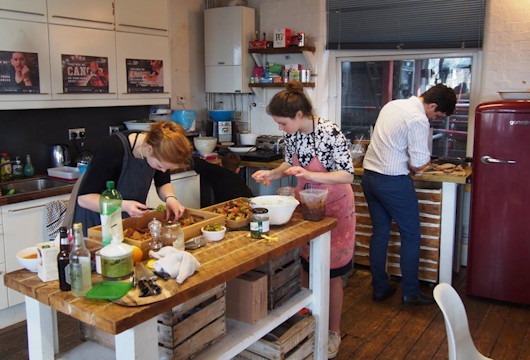

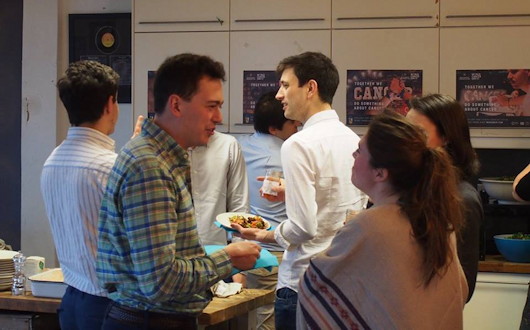
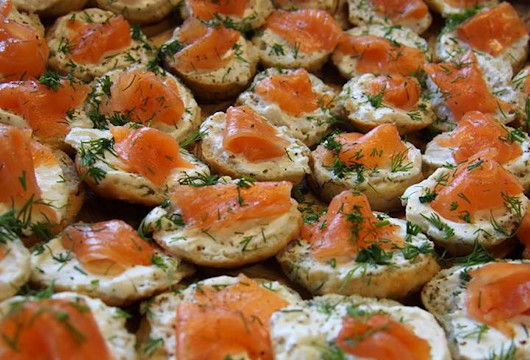
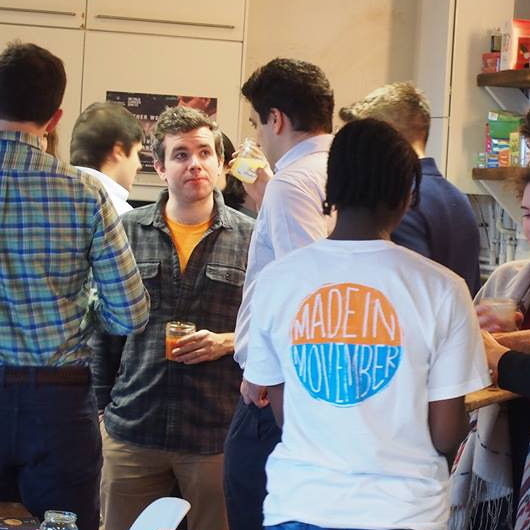

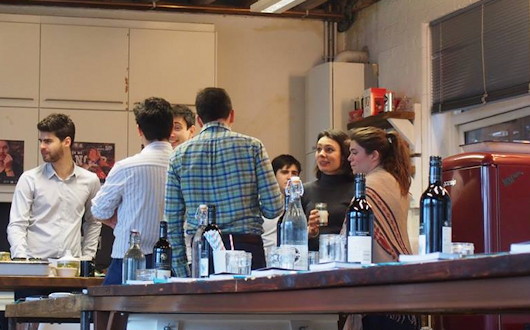
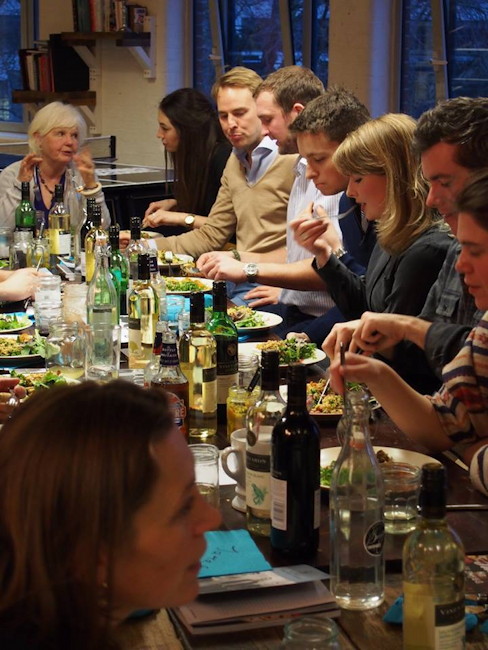
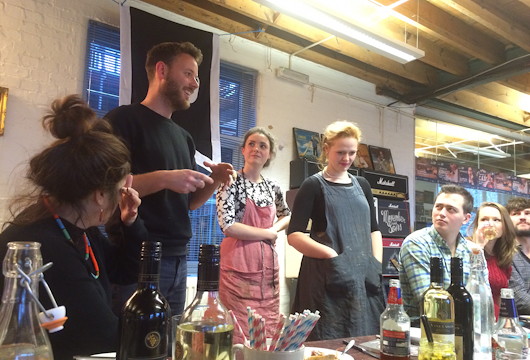
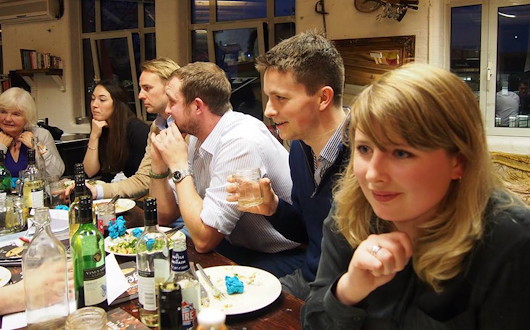
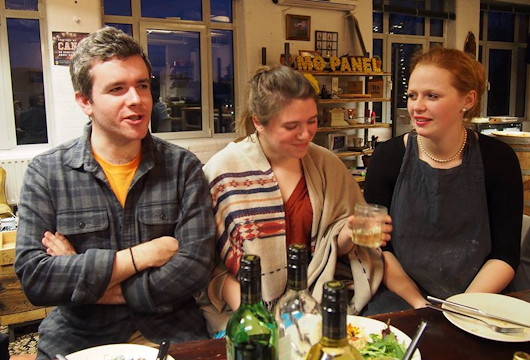
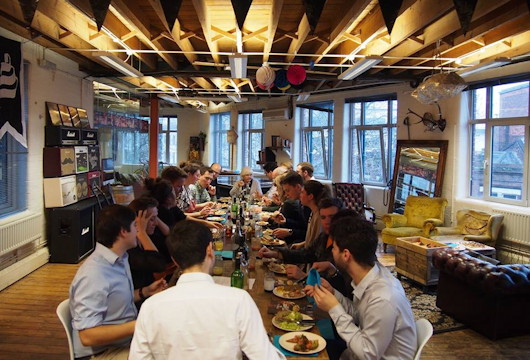
Florence to London on Twenty Euros
THERE COMES A POINT in every young man’s life when his trust fund manager goes on holiday. It is fitting that what follows occurred during International Poverty & Homelessness Awareness Week and, certainly, I hope that my experience will raise awareness among the demographics concerned as to how they should conduct themselves.
ITALY
Let me tell you about poverty: there is poverty, there is urban poverty, and there is urbane poverty. The story of my rapid regression through these strata starts in the billionaire’s playground that is Forte dei Marmi. I had already accepted the invitation when I realised I had blown my last €30 on a bottle of Frescobaldi (I’m not a wine snob, but I only buy from friends). We had arrived in Vieri’s 1988 Posche 911 and being a Friday night in early August, Mina’s Bussola club was chocked to the gunnels with a vast array of Eurotrash. There were refugees from Biarritz, Ibiza clubbers who got rich, Moscow clubbers who fell out with Putin, abstract artists, Botox-pumped bankers wives and industrialists’ daughters from Munich and Frankfurt, all vamped up on HRT, champagne, and Prozac. It was as raucous as the bombing of Dresden, and nearly as fun. Imagine someone had pumped laughing gas into the celebrity arrivals gate at Heathrow, and you’ll get the picture. (more…)
Curiosity Killed the Cat
Or: our love/hate relationship with the Phoenix, Chelsea
It was an unusually warm evening for a night in March, which is to say that it was not horrendously cold and you could tarry a while outside without fear of frostbite. Given the nature of his job, Nicholas is not frequently free to socialise, as he has to be doing certain things in certain places at certain times, which sometimes involves being in Greece or a sudden trip to Anguilla (“I’m not doing any more Caribbean islands — I’m fucking tired of them.”). But when he does manage to free himself from indentured servitude, we often find ourselves at the Phoenix on Smith Street.
All sensible right-minded people love the Phoenix and hate the Phoenix. It is a wonderful place, comfortable and delightful, yet somehow attracts the very worst and most tiresome lot of humanity. “Look at these estate agents,” Nicholas moans in the put-on snobbery which has become one of his traits. “They all live in Fulham I’m sure.” (Which is rich, as I live even beyond Fulham). Kit and H. were dining there with Ivo & la B a week or two earlier (or later) and such was the tiresomeness of the crowd that Kit texted Ivo “What a bunch of overgrown yuppies” (or something along those lines).
It’s delightful during the day, and there was one afternoon not long ago when, sauntering down the King’s Road, I ran into Prof. Pink on his way to John Lewis and managed to waylay him into an enjoyable conversation at the Phoenix over two large glasses of the house white. But during the evening the crowd gets so horrendously up-itself that it almost becomes an attraction in itself. “It’s ten o’clock on a Friday night. Shall we drop in to Smith Street and see how awful everyone is?” The experience ends up infecting one with a reverse snobbery almost as snobbish and pretentious as the pretentious snobbery one is reacting against in the first place.
As I was saying, it was a warm evening and Nicholas managed to find an ideal parking spot within sight just round the corner on Woodfall Street. I think it was a Friday or a Saturday so naturally the place was packed inside and I’m partial to the occasional Dunhill so enjoying an exceptionally refreshing cider outdoors with a cigarette was the obvious way forward. I lit up and Nikolai — very generously, as I’m sure it was my round — went inside to brave the crowds in search of drink. Now the curious thing about the smoking ban is that it has turned previously insular cells of humanity — smokers, that is — into a sort-of fraternité universelle. People who have absolutely nothing in common but for being at the same drinking establishment now, for better or worse, through the medium of tobacco, enjoy a recognisable commonality which can frequently turn conversational.
A little Spanish man with a moustache had a party inside celebrating his birthday — 31st, I think — and he ventured outdoors for a smoke and somehow or other conversation was initiated. A pleasant enough fellow but his chat was unexceptional and was suddenly interrupted by the arrival by cab of two tall-ish and rather fashionable Azeri girls, who may have been friends of friends of his or may have had nothing to do with him at all. Being a chatty Spaniard (and perhaps a bit ambitious) he engaged them in conversation almost as soon as they alighted their cab.
After the innocuous pleasantries of introduction all round he eventually asked the Azeri duette, “So where do you girls live?” “Knightsbridge” they replied. “Ah, cool, I’m in Knightsbridge a lot,” our Spanish friend replied as Nicholas, turning away, launched upon a severe, disapproving rolling of the eyes. “Why?” I interjected, somewhat mischievously pricking the balloon of his pretentiousness. After all: what possible excuse could anyone who neither works nor lives there reasonably have for being in Knightsbridge a lot? He turned towards me and with an irritated smile said “My friend, you are too curious; you ask too many questions.”
The Azeri girls remained unconvinced of him, and the birthday boy, having finished his cigarette (which I think came from my pack), sheepishly returned inside where his presumed friends had doubtless continued the celebration of his birth in his brief absence.
But we still all love the Phoenix.
A Bill Committee in the Commons
A Bill Committee meeting in one of the richly decorated committee rooms of the Palace of Westminster. The Minister is standing, rattling on in an explanatory defence of his government’s bill. Ostensibly these committees exist so that MPs can examine legislation in line-by-line detail and raise questions about whatever points or aspects they believe might cause problems if enacted.
“The question is that Clause 15 stands as part of the Bill.”
The Chairman, an MP of considerable experience, presides, assisted by a retinue of civil servants. He chews a pen and stokes his brow, frustrated by the boredom of the subject at hand. He is perhaps thinking of the weekend and the extreme unlikeliness that he will get down to the coast, and his sailboat, given the inclement weather.
A Scottish Member rises on a Point and the Minister yields the floor. Concerns are expressed about the precise meaning of Subclause 36 Paragraph C and insinuations made about potential costs. The Minister rises and suggests the Member’s criticism is excessively harsh. He then concedes he may have been imprecise in his explanation of the process involved in Subclause 36 Paragraph C.
The Doorkeeper, absurdly and arcanely attired in white tie, tails, and with the royal arms hanging from a gold chain round his neck, wears thick-rimmed glasses and leans back on a desk in a carefree fashion, blissfully paying little attention to the point the Hon. Gentleman has made in response to the proposed amendment.
“Just for the sake of clarity, we are not now talking about Amendment 13?”
“I have no intention of moving Amendment 13.”
“On a Point of Order then, Mr Chair, is it proper that the Member discuss Amendments 21 and 26 when he is not moving Amendment 13, which is the first Amendment to be considered?”
The Chairman corrects that it is perfectly alright for the Member to discuss whichever amendment he would like.
There are at least eleven civil servants in the room. One on the side hands a paper to another. He reads it and nods approvingly before passing it on to the civil servant next to the Chair. Another Member rises to discuss Amendment 54 Clause C.
“There’s an important role for an independent body to exercise scrutiny over this area and it would be wise for it to have a statutory basis.”
The entire proceedings are overshadowed by the continual sound of shuffling papers. One Member doodles on the day’s order-paper. A journalist leaves. The Member stops doodling and consults his iPhone. Then the Minister is grateful for that point. He is surprised but aware, since he was given this junior ministerial role, by the frequency with which this matter has arisen and has spoken before the relevant Select Committee.
Another Member’s face is illuminated by the glow of the iPad he is leaning over.
“Now before I become too Churchillian,” the Minister continues, “I think we’d better turn to the matter of the Amendments. Now the Honourable Member has, perhaps understandably, raised the point…”
A female Member smiles and shares a jest with one of her party colleagues. The Doorkeeper’s shift ends and he is replaced by one of his bearded confrères. The civil servant beside the Chairman folds a paper and stares unthinkingly into the distance.
“In respect for the Hon. Gentleman’s desire for continuing debate and discussion with the relevant authorities…”
“He hasn’t addressed my point about Subsection 2!”
The portly Doorkeeper moves with surprising adroitness in delivering a note from a Member to a civil servant across the room. The Minister’s PPS hands him a relevant paper. The Chairman smiles in response to one of the Minister’s light-hearted remarks.
“I’m sure the Minister will agree that this is not the beginning of the end but merely the end of the beginning.”
“If only!” a Member interjects.
It is 3:32pm. The MPs will be here for hours yet.
The Perfect Place for Coffee
I’m not sure when I became the sort of person who lounges around drinking coffee. I was never much of a fan of coffee, and remain deeply suspicious of it (hence, for example, refusing to become a daily coffee drinker — very dangerous!). I suppose it was on pilgrimage to Rome in my fourth year of university when I was introduced to the blessed simplicity of cappuccino e cornetto for breakfast; a total riposte to the traditional Scottish morning meals of my habit up ’til then.
After Rome, my daily habit became to rise around 9 o’clock, complete one’s morning toilette, head out around 10 to pick up Le Figaro and maybe The Scotsman if I was in the mood, and then a sugar doughring from Fisher & Donaldson, after which I would sit in Taste, the minuscule place on North St at the top of Murray Park which serves the best coffee in the Royal Burgh, for about an hour or so reading and staring out the window episodically while nursing a cappuccino. This was an exceptionally enjoyable routine, brought to an abrupt end by the cruel realities of the forward movement of time and finishing one’s degree.
Whether rightly or not, I’ve no idea, the concept of dwelling over coffee seems more a habit north of the Alps than south. The quick coffee seems more Italian, and more than once I stopped into Taste with Stefano or others for an unponderous espresso when an afternoon pick-me-up was deemed amenable.
But for the most part, I prefer to rest with a bit of coffee, and read something interesting. Last summer I found myself with a lot of free time in London and spent the greater portion of it in a curious little café-bar not open to the general public reading long historical articles off of JSTOR on such fascinating subjects as the origins of Argentine militarism or the unexpected nineteenth-century German Catholic revival as well as translations of the indispensable Pierre Manent printed in Modern Age.
There was barely ever anyone there in high summer except the two barstaff, myself, and a haggard journalist in late middle age sitting at the bar nursing his first pint of the day. I still go there from time to time, and recently enjoyed sitting there reading Perry Anderson’s trilogy of insightful, deep, and informative articles on India from the London Review of Books (‘Gandhi Centre Stage’, LRB 5 July 2012; ‘Why Partition?’, LRB 19 July 2012; ‘After Nehru’ LRB 2 August 2012).
There is a Pret near my flat where the staff are very nice, but I remember one Saturday morning when I actually stirred from my slumber and fancied catching up with the weekend Irish Independent. I happened to sit next to an awkward Indian computer engineer on a blind date with a Polish girl lacking in self-esteem. I found I could barely get any reading done with them nextdoor and instead relayed the essence of their conversation to a pretty girl sitting in bed in Oxford reading Glamour, who relayed back her own thoughts. The pros and cons of your average Pret come to mind and encourage me to explore what the perfect place for coffee would be like.
First, a coffee place should be mildly popular. There ought to be enough people milling around that it feels lived-in but not so many that you can rarely find a place to sit. The staff must be highly competent in their coffee making, and preferably either young, pretty, Italian, and female or else French chaps with a slightly haughty demeanour until the third or fourth time they see you. We will also accept vaguely hippie/alt-ish characters mostly from the Continent or occasionally the Antipodes. And Inez. (Inez, you can work at any coffee place approaching perfection).
Counter space! This cannot be emphasised enough: there ought to be counter space. I dislike when places have large, tall, bulky displays of the variety of pastries and such on offer and then have a tiny little open space to give your order and pay, etc. Broad counter spaces relay a certain openness and give the impression that the staff behind the bar are accessible. By all means display your delectamenta but you should aim for balance and harmony in your serving area.
There ought to be counter seating as well. Lots of coffee places put this at the window, which is acceptable, but as I like to sit in a large comfy chair and stare out the window, this is impeded by window counter seating, and thus I am mostly against it. And windows: we must have windows, preferably big giant ones with a single plane of glass looking out on a somewhat busy street, or even better a small public square.
Seating is one of the most important aspects. Hard or soft? High tables or low? In a word: both. There ought to be more café-style seats and round tables for when there’s three or four of you gathering, but also soft big comfy chairs for when that feels more appropriate. Different coffee-imbibing situations require different kinds of seating, and the perfect place for coffee should offer both.
I’ve yet to find the perfect place for coffee in London. I was quite fond of the Caffè Nero on Warwick Way in Pimlico with its huge glass panels that open up on summer days, but now that I no longer live in Pimlico it has ceased to be useful or easy to get to. As chains go, I tend to err on the side of Pret, perhaps merely out of habit. Whatever you do, just don’t go to Starbucks. Have some dignity and self-regard.
And if you do find the perfect place for coffee, do let the rest of us know.
A Mantelpiece
ONE MUST ALWAYS have a mantelpiece. That, at any rate, is my considered opinion. It is a focal point where one can place random objects of vague significance upon it as a salutary reminder of the varied importance of the numerous sectors of one’s life and the gentle interplay therebetween. In my admittedly brief (yet increasingly less brief) existence, I have had several mantelpieces. Indeed, I was even for a year at university in possession of a listed mantelpiece though, sadly, it was abused by the presence of an interloping non-functioning electric heater. But my current riparian London residence is augmented by a number of mantelpieces, one of which fortuitously sits in my own bedroom. While I generally prefer to leave things unexplained, here is a little guide to my mantel as it now stands.
Behind the entire tableaux hangs a French map of Africa I picked up during the summer I lived in Oxford. The recent independence of South Sudan renders it inaccurate, in addition to two or three vexillological changes in its corner display of flags. From left to right, we have the pennon of the Order of Malta in Scotland; the piece of the Berlin Wall my kindergarten teacher brought back from Germany for me; a Rackham postcard from Don Riccardo illustrating depicting a scene from Baron Foqué’s Undine (“Soon she was lost to sight in the Danube”), to which Don Riccardo has added the cryptic line “The fate, it seems, of all Cusack’s loves”.
Next is the glass flask with leather covering I picked up at an antiques place in Millbrook when wandering around hunt country with the Gills; a postcard of Bonnie Prince Charlie sent by the Cap’t as a thank-you note for hosting lunch at Rocca with our favourite ancient veteran of King’s African Rifles; the order of service from the University of St Andrews Alumni Club London carol service; a small bottle of Unicum brought back from Hungary by E.W.; a Marian prayer card from Tom & Alice; a little unpretentious triptych some relative bought; my Order of Malta Lourdes pilgrimage medal; an Infant of Prague retrieved from my grandparents’ house; a St Benedict medal (perhaps obtained at Downside).
The bottle of Boplaas Port was kindly (and perhaps unintentionally) left by one of the previous South African residents of our flat. It was finished off by our Continental correspondent Alexander Shaw and I late one night when he had just alighted the Eurostar and not yet had time to drop his bags off at his grandmother’s place a few minutes up the river on Chiswick Mall. Cornelius Bear is dressed in the red gown of a St Andrews undergraduate. Behind him is a Quebec automobile numberplate and a prayer card from St Philip’s Day 2012 at the Oratory. My Magister Artium diploma is rolled up in its tube next to an empty box of Dunhills purchased in Milan — “Il fumo invecchia la pelle” it warns. Surmounting all is a palm from Palm Sunday at the Oratory.
The American Drugstore
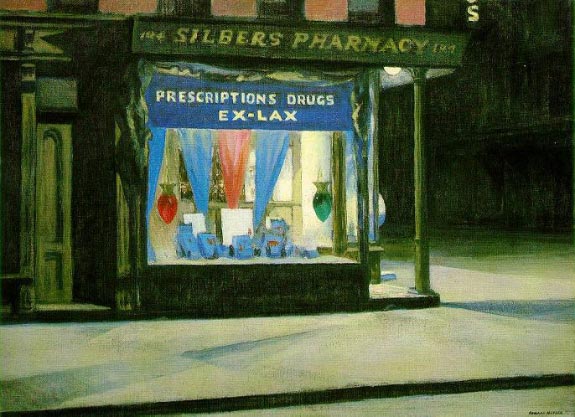
by Julián Marías
I REMEMBER MY ARRIVAL in Salt Lake City on a long shining train which had just crossed the endless plains of Illinois, Iowa, Nebraska, Wyoming, and now had entered the land of the Mormons. When I got off the train and began to walk down the long avenue, now slick with ice, which stretches from the station to the Mormon Temple, I asked myself what I had lost in Utah, in this place where I didn’t even know the name of a single person. Undoubtedly the blame was this time – as in so many other cases – Jules Verne’s. Do you remember his Around the World in Eighty Days? Phineas Fogg, the phlegmatic gentleman, and his roguish servant Passepartout; in their company I came to know Utah and its Mormons for the first time, in my early youth. But let’s not deceive ourselves: youth somehow remains with us; I had a date with Salt Lake City from the age of ten, and now I was keeping it, walking slowly through the snow along a deserted street, toward the Mormon Temple, which glowed in the distance, and which can only be entered by the faithful.
This enormous temple, brightly lighted, seemed to orient and give meaning to the city. Very close by, the mountains, which surround the city and are visible on all sides, creating in its midst the image of a wild West. Frozen and almost deserted streets. And suddenly, the drugstore! There, in Salt Lake City, I finally understood its meaning. Always open, day and night, in any weather, brilliantly lit up like a beacon in the middle of the night, sheltering and hospitable like a port, full of things … like a drugstore, for in no other place are there so many things. Twenty-five-cent books on revolving wire stands; children’s records; magazines and newspaper; cigarettes, cameras, candies, luggage, electrical appliances, chairs, pens, toys, glasses, perfumes, stationery fishing tackle … anything you can think of. Since it has everything, there are even drugs and prescriptions in the American drugstore. And there is, strangely enough, a large counter, lined with plastic-covered stools, where one can order, at any hour of the day or night, and for a few cents, a couple of eggs, a cup of coffee, a milk shake, a hamburger, or what they call, with wonderful inventiveness, a cheeseburger. (more…)
The Mornings of the World
THERE IS A CERTAIN bizarre and unreasonable attraction about the existentialists — as if amidst all the ridiculous and fatuous statements they made, there was here and there a phrase in which, while utterly inexplicable, one can nonetheless find some deep resonance. This is especially true of Camus, who (for me) is instantly the most convincing of that lot, and – perhaps because of that – the one most naturally separable from them.
Camus, I read somewhere, had a particular phrase or concept or perhaps even idée fixe that constantly resurfaced in several of his works: the morning of the world, or les matins du monde (as Camus rendered it in plural). (more…)
Cocktail, Anyone?
A journey into the drinks cabinet
The multifaceted realm of blogging has been penetrated by a friend and occasional drinking partner of mine. Known only as the Sybarite, he brings us a few thoughts on the inhabitants of the drinks cabinet. I thought I’d share his thoughts with you, as well as adding a dash of mine own into the mix. (more…)
Saints in Heaven, Pray for Us!

There are events occurring very soon which have massive life-changing potential for your humble & obedient scribe, and which could go quite horribly wrong or astoundingly well.
I absolutely implore you to pray to all the saints in Heaven, and especially to whichever Guardian Angels may be relevant, to combine, conspire, pray, and intercede for my special intention.
Thank you in advance for all your prayers, and I will keep you all in my prayers as well.
Brown 26, Yale 14
B.U.R.F.C. 1st XV v. Y.U.R.F.C. 1st XV

I never paid much attention to rugby before I lived in South Africa, where it is inescapable, especially since I was studying at Stellenbosch, which the rugby-est of rugby universities. After becoming a rugby spectator you cannot go back to watching American football, which, with its stopping and starting, suddenly has the feeling of being a demented child’s game. And so, across the Connecticut border to trusty old New Haven, to join some friends and fellow club-members for some Saturday afternoon rugby and revelry, with champagne, whiskey, and home-brewed porter on offer. (more…)
Popping in to the Yale Daily News
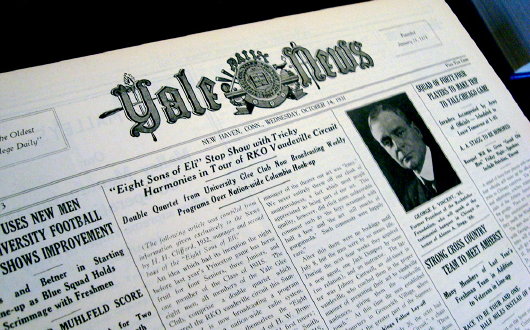
With a bit of time to spare between the rugby match and dinner, we discovered a friend of ours was exploring the newly renovated headquarters of the Yale Daily News and were invited to join in. The handsome gothic structure is now overshadowed by an ugly extension to the previously ugly Yale School of Architecture, widely believed to be the ugliest building in town. Henry Luce paid for the YDN building out of his own pocket in memory of his Yale classmate Briton Hadden, who died just 31 years old. The place went up in 1932 and underwent a multi-million-dollar renovation over the summer, and the place was looking good. (more…)
Maine
Well, your humble and obedient scribe is retreating to the coast of Maine, whence the defeated loyal men of Berwick fled after suffering defeat at the hands of the wretched Cromwell in the Battle of Dunbar. I am bringing a few friends along, including Mssrs. Trollope, Goethe, Burns, Chesterton, Balzac, von Rezzori, and a Ms. Undset (I am finally more than two-thirds of the way through Kristin Lavransdatter). There may also be a corgi or two. Internet connectivity very sketchy in those parts, though I will see if I can send a pigeon back to Hogarth if any news. (Doubtful it would do any good; the last e-mail I had him send he instinctively translated into dots and dashes — he does remind me of Uncle Otto sometimes).
So I bid you farewell, and you can expect my return in a fortnight’s time, invigorated anew by the salty breeze.
Martin Gardner
IT’S ONE 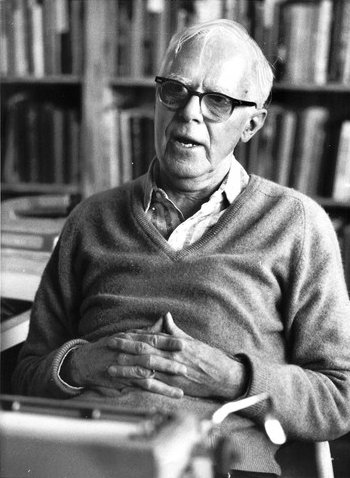 OF those strange things that I always automatically assume that anyone I know or have had dealings with cannot, by any stretch of the mind, be considered famous or well-known. The falseness of this assumption was made apparent to me when I picked up this week’s Economist after it arrived through the mail slot. As usual, there were a number of fascinating and well-informed articles, on the airlines of the Gulf, on the Colombian election, a special report on South Africa, and more. But then I finally reached the end pages and read the full page obituary of “Martin Gardner, man of letters and numbers,” who died on May 22nd at 95 years of age.
OF those strange things that I always automatically assume that anyone I know or have had dealings with cannot, by any stretch of the mind, be considered famous or well-known. The falseness of this assumption was made apparent to me when I picked up this week’s Economist after it arrived through the mail slot. As usual, there were a number of fascinating and well-informed articles, on the airlines of the Gulf, on the Colombian election, a special report on South Africa, and more. But then I finally reached the end pages and read the full page obituary of “Martin Gardner, man of letters and numbers,” who died on May 22nd at 95 years of age.
I never met Mr. Gardner but interacted with him several times during my New Criterion days by phone, and good old-fashioned post. He was a regular though not a frequent contributor to the magazine and was singular in that he was the only writer with whom the editor did not have the option of contacting via that nebulous mystery called the world-wide web. It was often, I confess, a source of some frustration that one would have all ones eggs in a row regarding pieces edited and signed off, and then there’d be something to do with Martin Gardner’s work and one would think “Blast! You mean I’ve got to stick this in an envelope to get the final OK?” Of course, when The New Criterion was founded, there was no internet, so there was a time when the whole magazine — indeed when every magazine — was put together via what I called the Martin Gardner method.
This aspect notwithstanding, it was always a pleasure working with Mr. Gardner, who was unfailingly polite over the phone when he would call in with his changes to our edits. It’s one of those inevitable aspects of death that one often discovers more interesting facts about the deceased than one ever knew while he was alive. In Martin Gardner’s case, it’s that this science maven published a number of annotated editions of works by G. K. Chesterton.
Roger Kimball writes of his last contact with Martin Gardner just a short time ago:
I wrote to tell him about the coincidence that a good friend now occupies the house he lived in for decades on Euclid Avenue (how’s that for an appropriate name?) in Hastings-on-Hudson, New York. I discovered this quite by accident. My wife and I were having dinner with a few other people at our friends’ house. I can’t remember Gardner’s name came up, but when it did I mentioned that he had lived for many years in Hastings-on-Hudson. “Yes,” said my friend, “and he lived in this very house.” One of the other couples present also knew Gardner. They recalled the time he invited them, shortly after they had moved to the neighborhood, to his house for drinks. Would it be alright if they brought their young children along, since no baby-sitter was available? Of course, nothing could be more agreeable! They arrived and Gardner proceeded to entertain the children with magic tricks for two hours.
My favourite story, however, is that he once wrote a devastating review of one of his own books and got it published under a pseudonym in the New York Review of Books. While he was a noted contributor to numerous sceptical reviews, he did come to a belief in God late in his life. “His declaration,” The Economist writes, “of this belief caused, he admitted, profound shock to those who knew him only as a sceptic. But there was too much playfulness in Mr Gardner to make him yield entirely to reason. His faith, he said, was based on an “emotional turning of the will”, unsupported by logic or science. It was his way, perhaps, of recognising that mind and man are not synonyms.”
Requiescat in pace.
In a Stellenbosch Garden
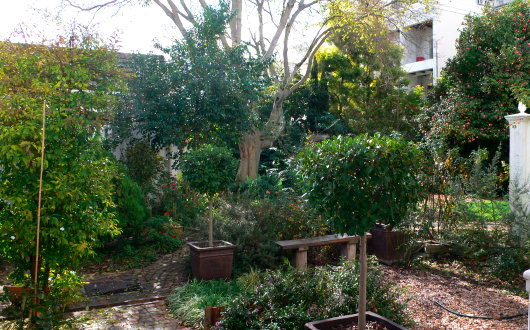
One of the pleasures of South Africa is that it is so conducive to the leafy things in life. Plants grow most of the year, so even while many of the trees may be bare, there is usually enough greenery about to keep things merry, as supported by the evidence of these shots of the garden of the little place in Stellenbosch where I used to live. Of course, this amenity to growth has its faults as well. Oak trees grow too quickly in this part of the world, leaving their wood too loose and unsuitable for use in barrelling. Wine- and brandy-makers must import their barrels from abroad, adding an irritating expense. Regardless of this incidental deficiency, South Africa still manages to produce some top-notch wines. (more…)
120 East End Avenue
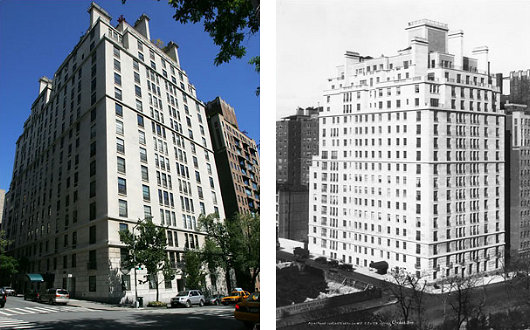
BACK IN MY school days, there was a girl in this building who threw rather good parties. Even at a decent event, however, one or two are bound to show up that really ought not to have done so, and at one of these parties at 120 East End Avenue just such a person got wildly drunk, seized a half-full bottle of vodka (Smirnoff, I believe) and launched it out the window. As luck would have it, gravity deposited the vessel many floors below, landing right on top of windshield of the doorman who happened to be serving that night.
Now, doorman relations are important in Manhattan (as apartment building owners are quite aware). When Mr. & Mrs. Smith jaunt off to Paris, leaving Jenny at home, and some twenty-odd young lads & lasses show up requesting admittance to the Smiths’ place — the doorman knows all and sees all, and one must ensure that, upon Mom & Pop’s return, he doesn’t tell all. (more…)
A precursor of Springtime
Having had more snow than usual this winter, we have been blessed with a sudden warm spell that makes one appreciate spring’s coming is not far. While winter days are best spent indoors beside the hearth, today’s temperature made some significant flirtations towards 60°, thus requiring a venture outdoors. Bescarved and betweeded, I tromped through the fields, greeted by birds singing an unusual tune, perhaps surprised by the lack of late winter’s usual frigidity. Viewing the leafless trees and the lifeless vegetation there is little doubt winter is still definitely upon us. But at least some of our avian friends remain amongst us.
Over two-hundred species of bird, the enthusiasts tell me, have been sighted in the fields and marshes through which I tromp. Most famously, twenty years ago a Wood Sandpiper — Tringa glareola — found its way to these parts. The Wood Sandpiper breeds in Scandinavia and spends northern winters in southern Africa or Australia (a not disagreeable routine, one would suppose). The 1990 Wood Sandpiper of Westchester whetted the whistles of birdwatchers (themselves a curious species) up and down the Eastern seabord. (more…)
An Evening at the Travellers Club
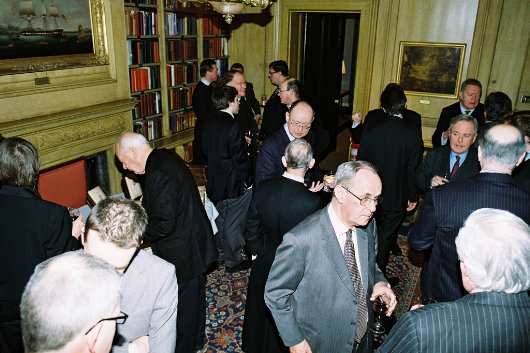
Photo: © Zygmunt von Sikorski-Mazur
TO CLUBLAND, THEN, for a book launch. Of course the secret about book launches is that they are often enough a convenient excuse to assemble a whole troop of interesting characters together, with the introduction of a newly published volume occupying a secondary (while nonetheless prominent) role. In this, our esteemed hosts Stephen Klimczuk and Gerald Warner of Craigenmaddie, authors of Secret Places, Hidden Sanctuaries, exceeded themselves. For me, the evening actually began not in the Travellers but just around the corner in the Carlton Club. Rafe Heydel Mankoo had suggested meeting up there for a drink or two or three before proceeding thencefrom toward the book launch at the Travellers. Pottering over from Victoria, I arrived at the Carlton and was guided towards the members’ bar where I easily found Rafe nursing a drink beside the hearth.
The usual updates were exchanged of various goings-on that had taken place since our last combination in August. Conversation naturally turned to Canada (where Rafe was raised) and shifted to New Zealand just before we greeted the arrival of Guy Stair Sainty. Guy I first met just four years ago while enjoying a pilgrimage to Rome. We happened to stumble upon him in the Piazza San Pietro (as one does with an odd frequency in the Eternal City), and, as it was my birthday, we invited him to join us for some champagne at this little place that overlooks the square. Guy was then in the midst of completing for Burke’s Peerage the massive, two-volume World Orders of Knighthood & Merit, or “WOKM”, which loomed restively on a nearby table as we sipped our drinks in the Morning Room. (more…)
Search
Instagram: @andcusack
Click here for my Instagram photos.Most Recent Posts
- Burns Tower April 19, 2024
- Patrick in Parliament March 18, 2024
- Articles of Note: 13 March 2024 March 13, 2024
- Cambridge March 9, 2024
- Taken on Trust March 4, 2024
Most Recent Comments
Book Wishlist
Monthly Archives
Categories



